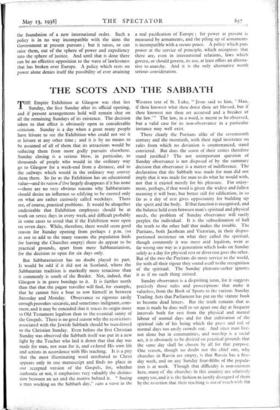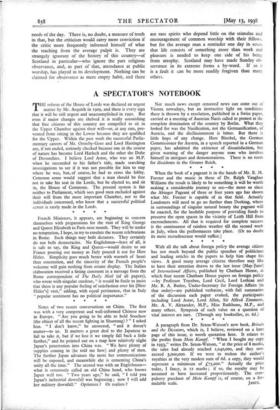THE SCOTS AND THE SABBATH T HE Empire Exhibition at Glasgow
was shut last Sunday, the first Sunday after its official opening, and if present arrangements hold will remain shut on all the remaining Sundays of its existence. The decision taken to that effect is obviously open to considerable criticism. Sunday is a day when a great many people have leisure to see the Exhibition who could not see it at leisure at any other time ; and it is by no means to be assumed of all of them that its attractions would be seducing them from more godly pursuits elsewhere. Sunday closing is a serious blow, in particular, to thousands of people who would in the ordinary way go to Glasgow for a week-end from a distance, and to the railways which would in the ordinary way convey them there. So far as the Exhibition has an educational value—and its raison d'être largely disappears if it has none —there are no very obvious reasons why Sabbatarians should desire an influence so edifying to be exerted only on what are rather curiously called weekdays. There are, of course, practical problems. It would be altogether undesirable that Exhibition employees should be at work on seven days in every week, and difficult probably in some cases to avoid that if the Exhibition were open on seven days. While, therefore, there would seem good reason for Sunday opening from perhaps r p.m. (so as not to add to the many reasons the population finds for leaving the Churches empty) there do appear to be practical grounds, apart from mere Sabbatarianism, for the decision to open for six days only.
But Sabbatarianism has no doubt played its part. It would be odd if it did not in Scotland, where the Sabbatarian tradition is markedly more tenacious than it commonly is south of the Border. Not, indeed, that Glasgow is in grave bondage to it. It is further north than that that the pagan traveller will find, for example, that he cannot hire a boat to row himself in between Saturday and Monday. Observance so rigorous easily enough provokes sarcastic, and sometimes indignant, com- ment, and it may be conceded that it traces its origin more to Old Testament legalism than to the essential sanity of the Gospels. There is no good reason why the restrictions associated with the Jewish Sabbath should be transferred to the Christian Sunday. Even before the first Christian Sunday was observed the Sabbath itself was put in a new light by the Teacher who laid it down that that day was made for man, not man for it, and ordered His own life and actions in accordance with His teaching. It is a pity that the most illuminating word attributed to Christ appears only in one manuscript and finds no place in our accepted version of the Gospels, for, whether authentic or not, it emphasises very valuably the distinc- tion between an act and the motive behind it. " Seeing a man working on the Sabbath day," runs a verse in the Western text of St. Luke, " Jesus said to him, ' Man, if thou knowest what thou doest thou art blessed, but if thou knowest not thou art accursed and a breaker of the law.' " The law, in a word, is meant to be observed, but a valid case for its non-observance in a particular instance may well exist.
There clearly the Puritans alike of the seventeenth century and the twentieth, with their rigid insistence on rules from which no deviation is countenanced, stand convicted. But does the scorn of their critics therefore stand justified ? The not unimportant question of Sunday observance is not disposed of by the summary decision that observance is a matter of indifference. The declaration that the Sabbath was made for man did not imply that it was made for man to do what he would with, nor that it existed merely for his pleasure. For enjoy- ment, perhaps, if that word is given the widest and fullest meaning it will bear, but better still for edification, in so far as a day of rest gives opportunity for building up the spirit and the body. If that function is recognised, and the balance held even between man's spiritual and physical needs, the problem of Sunday observance will rarely perplex the individual. It is the subordination of half the truth to the other half that makes the trouble. The Puritans, both Jacobean and Victorian, in their dispro- portioned insistence on what they called the spiritual, though commonly it was mere arid legalism, went as far wrong one way as a generation which looks on Sunday solely as a day for physical rest or diversion goes the other. But of the two the Puritans do more service to the world, for with all their rigour they sound a call to the recognition of the spiritual. The Sunday pleasure-seeker ignores it as if no such thing existed.
Sunday observance is a dispiriting term, for it suggests precisely those rules and proscriptions that make it valueless, from the Book of Sports to the various Sunday Trading Acts that Parliament has put on the statute book to become dead letters. But the truth remains that as man is made he does well to set apart one day at frequent intervals both for rest from the physical and mental labour of normal days and for that cultivation of the spiritual side of his being which the press and toil of normal days too easily crowds out. And since man lives not alone but in communities, and worship is a social act, it is obviously to be desired on practical grounds that the same day shall be chosen by all for that purpose. One reason, though no doubt not the chief one, why churches in Russia are empty, is that Russia has a five- day week, and on any Sunday four-fifths of the popula- tion is at work. Though that difficulty is non-existent here, many of the churches in this country are relatively empty too, and it is the fashion to justify disregard of them by the assertion that their teaching is out of touch with the needs of the day. There is, no doubt, a measure of truth in that, but the criticism would carry more conviction if the critic more frequently informed himself of what the teaching from the average pulpit is. They are strangely ignorant of the history of this country—of Scotland in particular—who ignore the part religious observance, and, as part of that, attendance at public worship, has played in its development. Nothing can be claimed for observance as mere empty habit, and there are rare spirits who depend little on the stimulus and encouragement of common worship with their fellows, but for the average man a reminder one day in seven that life consists of something more than work and pleasure is needed to keep one side of his being from atrophy. Scotland may have made Sunday ob- servance in its extreme forms a by-word. If so it is a fault it can be more readily forgiven than many others.















































 Previous page
Previous page